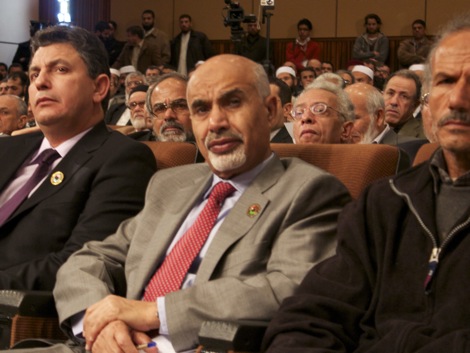By Sami Zaptia.
Tripoli, 2 January:
Juma Attaiga, the First Deputy head of the General National Conference (GNC) condemned the demonstration tactics used . . .[restrict]by some Supreme Security Committee (SSC) members at the GNC building last night as ‘unreasonable’.
Speaking live in an interview on the Libya Al-Ahrar TV station Attaiga seemed barely able to hide his anger at the tactics used by some SSC members demonstrating yesterday at the GNC.
The demonstrators were objecting to being forced by the government of Prime Minister Ali Zeidan into joining the official police force and were calling for the resignation of Interior Minister Ashour Shuwail.
The government has been ratcheting up efforts recently to persuade the various brigades of thuwar into either joining the official security forces as individuals, or disbanding. It had threatened to disband the SSC and to cease the payment of their wages by January.
In an angry outburst live on TV, the usually calm Attaiga said that the GNC “will not give in to blackmail. The blockage of the entrance of the GNC, the insults thrown at some members and even stoning is unacceptable”.
“We had discussions with some of the representatives of the demonstrators and there was some understanding by both sides of the other’s point of view. But other members used totally unacceptable tactics of demonstration”.
Stressing the full right of Libyans to freedom of expression and demonstration first, Attaiga went on to reject the SSC demonstrators’ behaviour. “This is no longer bearable, these tactics are no longer bearable and are uncivilized. I call on the Libyan public to speak out against them.”
Attaiga’s outburst has been seen by some as a sign that the new Zeidan government and GNC may be losing patience with former revolutionaries who are refusing to integrate into the security forces.
“This a betrayal of the blood of the martyrs. We can no longer keep quiet. We have a duty to the rest of the general public. We have work to do”.
“This is a legislative body and not an executive body ” he added, hinting that the demonstrators should address grievances to the government, not the GNC. “They came requesting the resignation of a Minister – this is no longer acceptable”.
Defending the GNC’s right to appoint ministers Attaiga said: “This is the will of the people they are transgressing. Many in the GNC will no longer accept this holier than thou attitude by some of the thuwar”.
“Many of the GNC members fought on the fronts too and have martyrs in their families too”, Attaiga said referring to the attitude by many of the revolutionary fighters who feel that they should have a special status in Libyan society having played an active role in the revolution against Qaddafi’s regime.
“We must confront these tactics. They are unacceptable by many Arab, Libyan or Islamic standards. The lack of respect of others and elders is unacceptable”, Attaiga added referring to the insults and stones directed by some of the demonstrators towards some GNC members.
“These demonstrators have no connection with the revolution. They want no institutions, no progress and no development” an exasperated Attaiga concluded.
Meanwhile, head of the GNC Mohamed Magarief, Prime Minister Ali Zeidan and Interior Minister Ashour Shuwail were giving speeches at a celebration of the official police forces in another part of town.
Hundreds of police officers gathered to celebrate the 61st anniversary of Libya’s 24 December Independence Day, displaying dozens of gleaming new patrol vehicles recently delivered to police departments in the capital. There were maneuvers, displays by police dog handlers and special forces units in helicopters in a scene that drastically contrasted with events outside the GNC.
The SSC was set up immediately after the liberation of Libya to integrate former revolutionaries into the various police departments and the armed forces to fill the security void caused by the revolution, and is effectively an umbrella organization encompassing individual revolutionary brigades all over Libya.
Many of these units have made clear their loyalty to the new government and indicated their willingness to integrate into various bodies within the security forces.
However, some of these brigades see themselves as the guardians of the 17 February Revolution and are suspicious of central government control. They also see the regular police and army as organs of state oppression and hideaways of Qaddafi loyalists and are reluctant to join such organizations.
Nearly two years after the Revolution, the general public is desperate for security and order. The pressure on the thuwar to enlist is growing and it seems that the GNC and the new Zeidan government are ready to confront them head-on. [/restrict]






